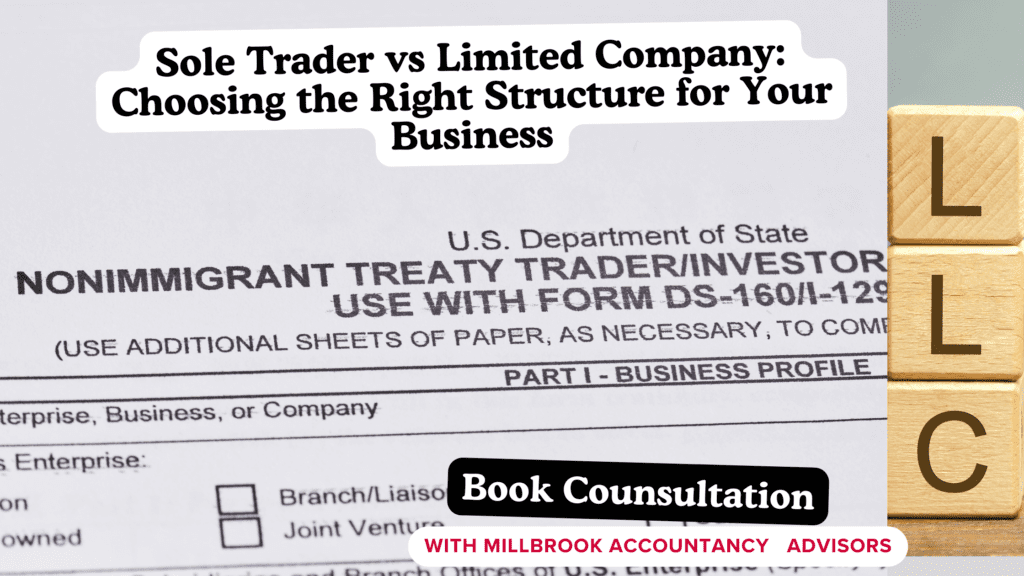When starting a business, one of the most critical decisions you’ll need to make is choosing the right legal structure. Two common options for small businesses are operating as a sole trader vs limited company. Each structure has its own set of advantages and disadvantages, and understanding them is crucial for making an informed decision that aligns with your business goals. In this comprehensive guide, we’ll explore the differences between sole traders and limited companies, the benefits and drawbacks of each, and factors to consider when making your choice.


1. Understanding Sole Traders vs Limited Company
1.1 Sole Trader
A sole trader, also known as a sole proprietorship, is the simplest form of business structure where an individual runs the business themselves.
1.2 Limited Company
On the other hand, a limited company is a separate legal entity from its owners (shareholders). It offers limited liability protection to its shareholders, meaning their personal assets are safeguarded in case the business runs into financial trouble.
2. Sole Trader vs Limited Company: Advantages and Disadvantages
2.1 Sole Trader Advantages
Simplified Setup: Registering as a sole trader is usually straightforward and involves minimal paperwork.
Direct Control: Sole traders have full control over decision-making and operations.
Tax Flexibility: Sole traders can claim tax deductions for business expenses and may benefit from certain tax allowances.
2.2 Advantages of a Limited Company
Limited Liability: Shareholders’ personal assets are protected from business debts and legal claims.
Enhanced Credibility: Operating as a limited company can enhance your business’s credibility and professionalism.
Tax Efficiency: Limited companies often benefit from lower corporate tax rates and more tax planning options.
2.3 Sole Trader Disadvantages
Unlimited Liability: Sole traders are personally liable for business debts, putting their personal assets at risk.
Limited Growth Potential: Operating as a sole trader may limit access to funding and growth opportunities.
Financial Risk: With no legal separation between business and personal finances, a sole trader’s personal assets may be at risk in case of business losses.
2.4 Disadvantages of a Limited Company
Complex Administration: Limited companies require more extensive administrative duties, such as filing annual accounts and maintaining company records.
Higher Costs: Setting up and running a limited company typically involves higher initial and ongoing costs compared to sole traders.
Less Privacy: Limited companies are subject to more regulatory scrutiny, which may result in less privacy for owners and directors.
3. Factors to Consider When Choosing Sole Trader vs Limited Company
3.1 Nature of Business
Consider the nature and scale of your business operations. Sole traders are suitable for small, low-risk ventures, while limited companies are better suited for larger, high-growth businesses.
3.2 Legal Liability
Evaluate your tolerance for personal risk. If you’re concerned about personal liability for business debts, forming a limited company may provide peace of mind.
3.3 Tax Implications
Consult with a tax advisor to understand the tax implications of each structure and determine which offers the most favorable tax treatment for your business activities.
4. Transitioning Between Structures
4.1 From Sole Trader to Limited Company
If your business outgrows the sole trader structure, you can transition to a limited company to benefit from limited liability protection and tax advantages.
4.2 From Limited Company to Sole Trader
Conversely, if your business needs change or you prefer a simpler structure, you can convert your limited company back to a sole trader status, although this process may have tax and legal implications.
5. Conclusion
Choosing between operating as a sole trader or forming a limited company is a significant decision that can impact your business’s success and your personal liability. Consider the advantages, disadvantages, and specific needs of your business before making a choice. Seek professional advice if necessary to ensure you make an informed decision that aligns with your long-term goals.
6. Tax Considerations
6.1 Sole Trader Taxation
They’re required to report their earnings and expenses on their personal tax return. While this structure offers simplicity in tax reporting, sole traders may miss out on certain tax benefits available to limited companies.
6.2 Limited Company Taxation
Shareholders may receive dividends from company profits, which are taxed at different rates than income tax. Additionally, limited companies can take advantage of various tax reliefs and allowances not available to sole traders.
7. Legal Responsibilities
7.1 Sole Trader
As a sole trader, you’re personally responsible for all aspects of your business, including compliance with legal and regulatory requirements. This includes fulfilling tax obligations, maintaining accurate financial records, and adhering to industry-specific regulations.
7.2 Limited Company
Limited companies have distinct legal identities separate from their owners, which means directors and shareholders have limited liability for the company’s debts and obligations. However, directors must fulfill certain legal responsibilities, such as filing annual accounts and fulfilling reporting requirements with Companies House.
8. Personal Liability and Risk
8.1 Sole Trader
One of the significant drawbacks of operating as a sole trader is the unlimited liability for business debts. In the event of business losses or legal claims, creditors can pursue the sole trader’s personal assets to settle debts, putting personal finances at risk.
8.2 Limited Company
Limited liability protection is one of the primary advantages of forming a limited company. Shareholders’ liability is limited to the amount they’ve invested in the company, shielding their personal assets from business-related risks and liabilities.
9. Flexibility and Autonomy
9.1 Sole Trader
Sole traders enjoy complete autonomy and control over their businesses. They can make decisions quickly and adapt their operations to changing circumstances without needing approval from shareholders or directors.
9.2 Limited Company
While limited companies offer limited liability protection, they may involve more bureaucracy and administrative overhead. Decision-making may be more complex, requiring consultation with shareholders and adherence to corporate governance procedures.
10. Making the Right Choice for Your Business choosing between Sole Trader vs Limited Company
Choosing between a sole trader and limited company structure depends on various factors, including your business goals, risk tolerance, tax considerations, and growth prospects. It’s essential to weigh the advantages and disadvantages of each option carefully and seek professional advice if needed to make an informed decision.
FAQs for Sole Trader vs Limited Company
What are the tax implications of operating as a sole trader versus a limited company?
Operating as a sole trader may result in different tax obligations compared to a limited company.
Can I change my business structure from a sole trader to a limited company later on?
Yes, you can transition from a sole trader to a limited company if your business needs evolve. However, this process involves legal and administrative steps, so it’s essential to plan and execute the transition carefully.
Are there any advantages to operating as a sole trader over a limited company?
Sole traders often enjoy simpler setup processes, greater autonomy, and flexibility in decision-making compared to limited companies. However, they also have unlimited liability for business debts.
How do I know if my business is better suited for a sole trader or limited company structure?
Consider factors such as the nature of your business, potential growth, legal liability concerns, and tax implications when deciding between a sole trader and limited company structure. Seek professional advice for personalized guidance.
What steps should I take if I want to close my sole trader business or dissolve a limited company?
Closing a business involves various legal and administrative procedures. Consult with a business advisor or attorney to ensure you follow the necessary steps and comply with legal requirements
If You want to know more about the sole trader and limitited company choice for your buisness feel free to contact Millbrook Accountancy Qualified Accountants and get a reliable free consultation.





